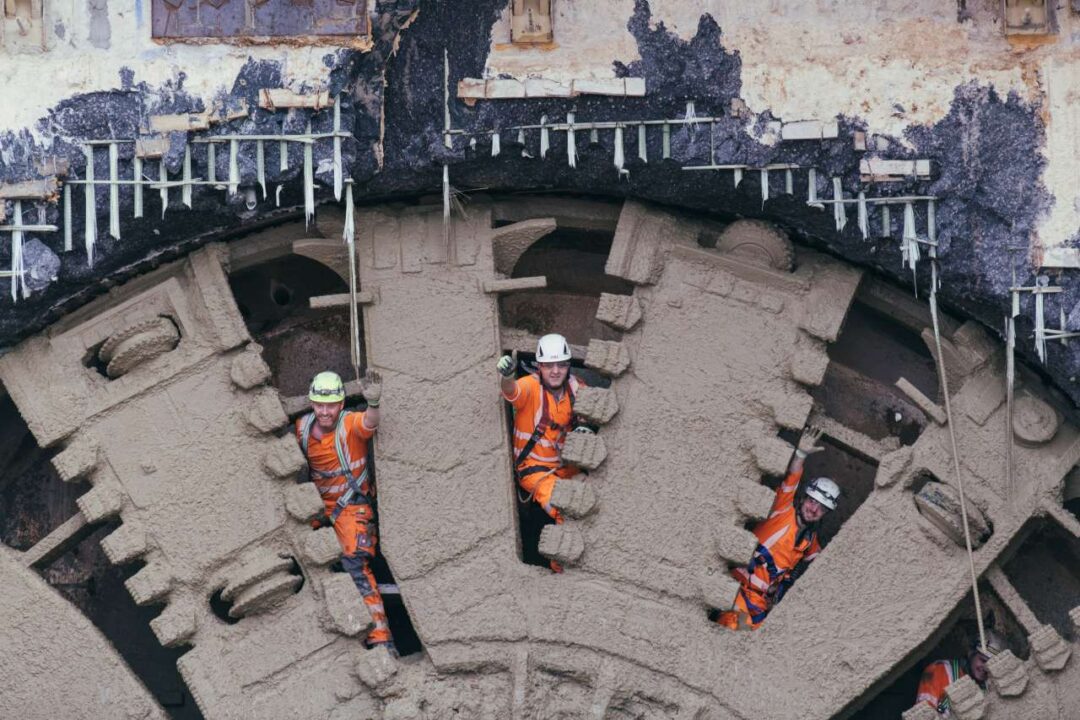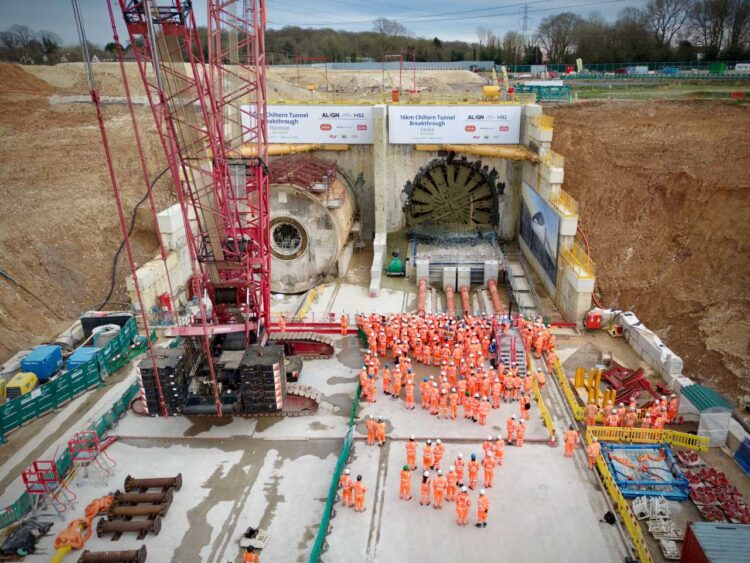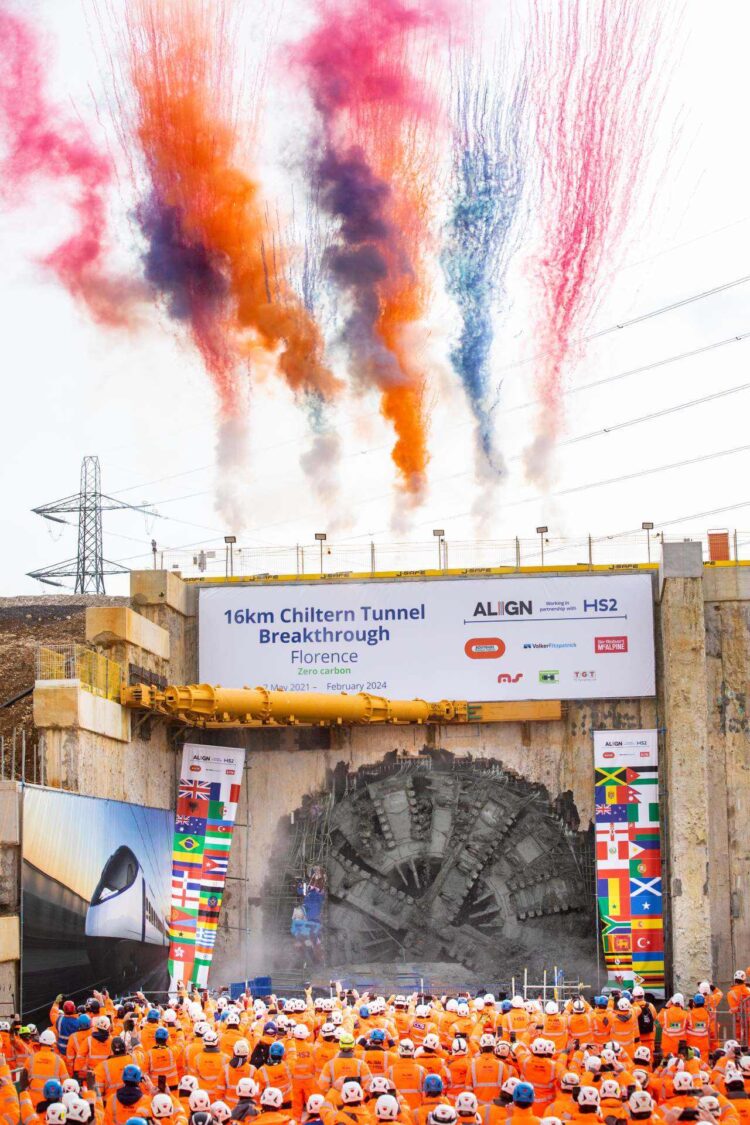A historical moment has been witnessed in the HS2 project as Cecilia the Tunnel Boring Machine (TBM), has completed its tunnelling of the longest tunnel on the new HS2 line.
She now sits alongside her partly dismantled sister Florence, who completed her parallel tunnel boring, 4 weeks ago at the northern worksite of the tunnelling project near Wendover, Buckinghamshire.
Both machines were built in Germany by TBM manufacturing specialists Herrenknecht, and were operated by Align, HS2s main contractor which is made up of three leading international infrastructure companies, Bouygues Travaux Publics, Sir Robert McAlpine, and VolkerFitzpatrick. breakes
The machines set off at different times during the early summer of 2021. They started at the southern end near the M25, with both TBMs tunnelling 10 miles.

Between them, Cecilia and Florence both weigh 2,000 tonnes and have removed three million cubic tones of spoil largely composed of chalk, at depths of 80 meters below the surface in places.
The machines are like moving factories, as they slowly move forward at approximately 16 metres per day, the rotating teeth cut through the spoil which is then removed on a conveyor belt to vehicles at the rear of the machine that carry it away.
As the machine moves forward, the tunnel it has created is lined with concrete tunnel segments from equipment housed in the rear of the machine, this stabilises the surrounding ground. Over 56,0000 pre-cast concrete tunnel segments have been used in the construction of the tunnel.
Each machine has been crewed by 17 members working in shifts, ensuring the machines run 24/7. They have been aided by a further 100 members working on the surface who have been ensuring the work has been progressing smoothly, while also handling the logistics of the tunnel construction.
A combined total of 450 people have worked on, or, inside the tunnels over the last 33 months. This includes the crews which have removed the spoil and the team that made the 112,000 fibre-reinforced concrete tunnel segments, each individual one having been precision made to line up and fit with the previous piece.

Cecilia has tunnelled what will be the HS2s down line tunnel, which will see trains travel from London to Birmingham and the north, while Florence has tunnelled the up line tunnel which will see future trains pass through it heading for London.
Both these tunnel bores of the Chiltern Tunnel are the longest on the line at 10 miles long, once the tracks are laid through the tunnels and the line is open, (currently planned for 2029 – 2033) trains at up to 200mph will pass through the bores on their respective journeys north and south.
This will not only double rail capacity on the West side of England heading to the north, but it will also free up space on the West Coast Mainline for local services, providing regular services and more reliable trains, while increasing economic growth.
Today is a remarkable achievement for all concerned. Cecelia’s arrival completes the excavation of HS2’s 10-mile twin-bore tunnel, but it’s only the end of the first chapter in the story of building Britain’s high-speed railway under the Chiltern Hills. Several years of intensive, world-class engineering lie ahead of us to complete the tunnels’ four ventilation shafts plus headhouses; install the mechanical and electrical plant and machinery, slab track and overhead electrical wires before trains begin passing through at 200mph.”
HS2 Ltd’s head of civil works for this section of the route, Mark Clapp
Ten miles is a long drive for a TBM, with a typical average being around three miles. The complexity and technical challenges of completing such a long drive for both our TBMs have been significant, however, I am delighted that as a team, we have risen to the challenge. Both TBMs were designed in partnership with Herrenknecht and incorporate innovations and technologies that have been introduced on TBMs in the UK for the first time, to enhance performance and safety. This includes ‘semi-continuous boring’, allowing our TBMs to build the rings that line the tunnels without pausing.”
Align’s Underground Construction Director, Didier Jacques

Recent research by HS2 Ltd estimates the West Midlands will receive an economic boost of £10 billion over the next ten years, as the new development around Birmingham’s Curzon Street continues. once complete the new station in Birmingham will offer easier access to both Birmingham Airport and the NEC.
The construction of HS2 is now at its peak. With new stations being built, viaducts under construction and completion of its longest tunnels, the line is being built to the most modern engineering standards to the highest degree, it will be fitted with real-time sensors to detect and prevent failures and it will be designed to cope with extreme weather conditions.





Responses